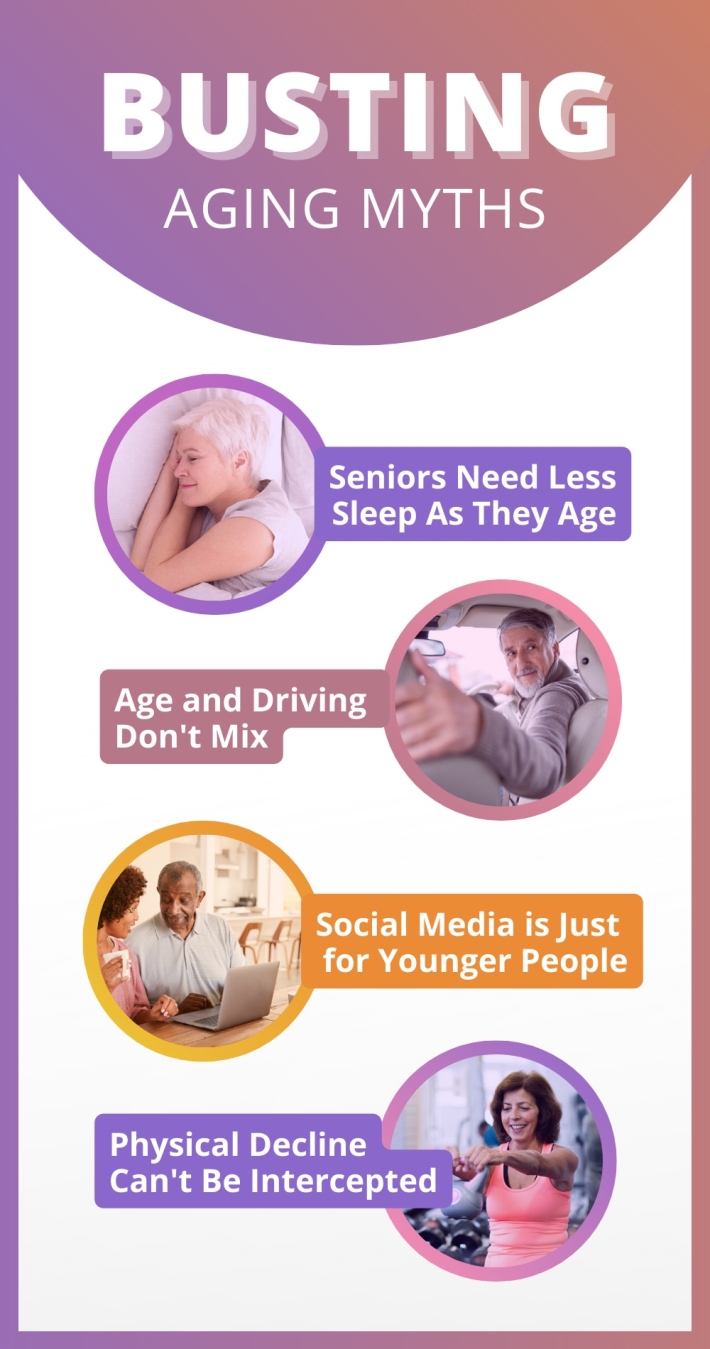Breaking Down Common Misconceptions About Aging
We're sure you've heard of some of these common misconceptions about aging. Read on to learn the facts behind the stereotypes.

Explore:

Let’s face it: Aging isn’t always graceful. But that doesn’t mean the myths and stereotypes about older people are true. In fact, aging stereotypes are often completely wrong. Aging may be inevitable, but that doesn’t mean you should buy into misinformation that hampers how you enjoy these golden years.
Why Stereotypes About Aging Should Be Debunked
Stereotypes of any kind can be detrimental, but for seniors, researchers believe stereotypes based in ageism set the bar too low, and that can negatively impact seniors’ cognitive and physical performance, as well as their self-esteem.
Today’s seniors are a different bunch than past generations. They’re more educated, more tech savvy, more connected. Some research even suggests they’re physically younger than their predecessors. They’re a far cry from the bumbling, clueless and helpless figures mocked in comedy skits, commercials and other aspects of pop culture.
Debunking Common Myths About Aging
Learn the truth about some common aging stereotypes. Here, we separate some misconceptions about aging from the facts.
Myth #1: Seniors Need Less Sleep as They Age
For a variety of reasons, you may not get as much sleep as you grow older, but that doesn’t mean it’s good for you. Your laid-back schedule, including the ability to nap during the day, may be sabotaging your sleep at night. Other factors like health conditions, medications and joint pain can all contribute to insomnia, and if you’re functioning through the day on subpar sleep, you may not even realize you’re short changing yourself. As a senior, you need about the same amount of sleep you did in your younger adult years — around seven to nine hours each night. Get less, and you’re increasing your chances of falls, trouble with your memory, and mood or mental health disorders, including irritability and depression.
Myth #2: Age and Driving Don’t Mix
While you may change your driving habits as the years pass, your ability to drive safely has little to do with the calendar and more to do with your personal circumstances. It’s true that as you age, your reflexes may be less sharp, and you may experience hearing or vision loss that affects your ability to perceive potential danger on the road. Even so, you have plenty of options for protecting your safety on the road. Not convinced? According to the Federal Highway Administration, about 20% of all drivers are 65 or older. As long as your doctor gives the green light — and you and your loved ones believe you’re safe behind the wheel — you can hit the road in good company.
Myth #3: Social Media Is Just for Kids
Younger generations may have led the charge headfirst into social channels like Myspace, Twitter and Facebook, but today, the demographics are evolving. More than 20% of Facebook users are over 55 (keeping up with family is a major motivation), and 40% of people 65 and older use some form of social media. You can even find seniors with major followings (people who enjoy regularly seeing their content) on platforms like TikTok, which skews heavily younger, with 60% of users between the ages 16 and 24. These influencers are covering all kinds of ground, from senior lifestyles and beauty to wellness and even celebrating the wisdom that comes with age.
Myth #4: Physical Decline Can’t Be Intercepted
It’s true that muscle tone and strength usually decline naturally over time, but that’s no reason to throw in the towel and settle for a steady decrease in mobility. Focusing on endurance, strength, balance and flexibility helps seniors retain their physical function. Protecting your physical wellness means eating a healthy diet, monitoring your mental health and, of course, getting regular exercise. You’ll see the results of making healthy aging a priority in many ways, from better sleep and improved weight control to lower stress and reduced health risks.
Myth #5: Cognitive Decline Is the Start of Dementia
Dementia is a form of cognitive decline, but you may be surprised to learn this is another aging stereotype, and it’s likely driven by fear. The very idea of developing dementia is worrisome, but the reality is, it’s a condition that affects a far smaller percentage of the senior population than not. Only about 14% of seniors ages 71 and older have dementia. What’s more, data proves cognitive decline (a noticeable change in mental abilities that is not severe enough to interfere with daily activity) doesn’t automatically lead to dementia. Only 20% of people who exhibit symptoms of cognitive decline will develop dementia within three years.
Straight Talk About Aging
Looking for more frank insight on topics affecting seniors? Be sure to browse our resource articles for more senior living and healthy aging topics.
Where You Live Matters is powered by the American Seniors Housing Association (ASHA), a respected voice in the senior housing industry. ASHA primarily focuses on legislative and regulatory advocacy, research, and educational opportunities and networking for senior living executives, so they can better understand the needs of older adults across the country.
